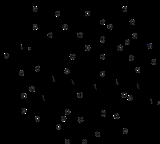
Ristocetin
Encyclopedia
Ristocetin is an antibiotic, obtained from Amycolatopsis
lurida, previously used to treat staphylococcal infection
s. It is no longer used clinically because it caused thrombocytopenia
and platelet
agglutination
. It is now used solely to assay those functions in vitro in the diagnosis of conditions such as von Willebrand disease
(vWD) and Bernard-Soulier syndrome
. Platelet agglutination caused by ristocetin can occur only in the presence of von Willebrand factor
multimers, so if ristocetin is added to blood lacking the factor (or its receptor -- see below), it will not coagulate.
In an unknown fashion, the antibiotic ristocetin causes von Willebrand factor to bind the platelet receptor glycoprotein Ib (GpIb), so when ristocetin is added to normal blood, it causes agglutination
In some types of vWD (types 2B and platelet-type), even very small amounts of ristocetin cause platelet aggregation when the patient's platelet-rich plasma
is used. This paradox is explained by these types having gain-of-function mutations which cause the vWD high molecular-weight multimers to bind more tightly to their receptors on platelets (the alpha chains of glycoprotein Ib (GPIb) receptors). In the case of type 2B vWD, the gain-of-function mutation involves von Willebrand's factor (VWF gene), and in platelet-type vWD, the receptor is the object of the mutation (GPIb). This increased binding causes vWD because the high-molecular weight multimers are removed from circulation in plasma since they remain attached to the patient's platelets. Thus, if the patient's platelet-poor plasma is used, the ristocetin cofactor assay will not agglutinate "standardized (ie., pooled platelets from normal donors that are fixed in formalin)" platelets, similar to the other types of vWD.
In all forms of the ristocetin assay, the platelets are fixed in formalin prior to the assay to prevent von Willebrand's factor stored in platelet granules from being released and participating in platelet aggregation. Thus, the ristocetin cofactor activity depends only upon high-molecular multimers of the factor present in circulating plasma.
Amycolatopsis
Amycolatopsis is a genus of high-GC content bacteria within the family Pseudonocardiaceae.These produce Epoxyquinomicin C, a weak antibiotic and anti-inflammatory agent....
lurida, previously used to treat staphylococcal infection
Staphylococcal infection
Staphylococcus is a genus of Gram-positive bacteria which includes several species that can cause a wide variety of infections in humans and other animals through either toxin production or invasion....
s. It is no longer used clinically because it caused thrombocytopenia
Thrombocytopenia
Thrombocytopenia is a relative decrease of platelets in blood.A normal human platelet count ranges from 150,000 to 450,000 platelets per microliter of blood. These limits are determined by the 2.5th lower and upper percentile, so values outside this range do not necessarily indicate disease...
and platelet
Platelet
Platelets, or thrombocytes , are small,irregularly shaped clear cell fragments , 2–3 µm in diameter, which are derived from fragmentation of precursor megakaryocytes. The average lifespan of a platelet is normally just 5 to 9 days...
agglutination
Agglutination
In contemporary linguistics, agglutination usually refers to the kind of morphological derivation in which there is a one-to-one correspondence between affixes and syntactical categories. Languages that use agglutination widely are called agglutinative languages...
. It is now used solely to assay those functions in vitro in the diagnosis of conditions such as von Willebrand disease
Von Willebrand disease
von Willebrand disease is the most common hereditary coagulation abnormality described in humans, although it can also be acquired as a result of other medical conditions. It arises from a qualitative or quantitative deficiency of von Willebrand factor , a multimeric protein that is required for...
(vWD) and Bernard-Soulier syndrome
Bernard-Soulier syndrome
Bernard–Soulier syndrome , also called hemorrhagiparous thrombocytic dystrophy, is a rare autosomal recessive coagulopathy that causes a deficiency of glycoprotein Ib , the receptor for von Willebrand factor, which is important in clot formation.The incidence is estimated to be less than 1 in 1...
. Platelet agglutination caused by ristocetin can occur only in the presence of von Willebrand factor
Von Willebrand factor
von Willebrand factor is a blood glycoprotein involved in hemostasis. It is deficient or defective in von Willebrand disease and is involved in a large number of other diseases, including thrombotic thrombocytopenic purpura, Heyde's syndrome, and possibly hemolytic-uremic syndrome...
multimers, so if ristocetin is added to blood lacking the factor (or its receptor -- see below), it will not coagulate.
In an unknown fashion, the antibiotic ristocetin causes von Willebrand factor to bind the platelet receptor glycoprotein Ib (GpIb), so when ristocetin is added to normal blood, it causes agglutination
In some types of vWD (types 2B and platelet-type), even very small amounts of ristocetin cause platelet aggregation when the patient's platelet-rich plasma
Blood plasma
Blood plasma is the straw-colored liquid component of blood in which the blood cells in whole blood are normally suspended. It makes up about 55% of the total blood volume. It is the intravascular fluid part of extracellular fluid...
is used. This paradox is explained by these types having gain-of-function mutations which cause the vWD high molecular-weight multimers to bind more tightly to their receptors on platelets (the alpha chains of glycoprotein Ib (GPIb) receptors). In the case of type 2B vWD, the gain-of-function mutation involves von Willebrand's factor (VWF gene), and in platelet-type vWD, the receptor is the object of the mutation (GPIb). This increased binding causes vWD because the high-molecular weight multimers are removed from circulation in plasma since they remain attached to the patient's platelets. Thus, if the patient's platelet-poor plasma is used, the ristocetin cofactor assay will not agglutinate "standardized (ie., pooled platelets from normal donors that are fixed in formalin)" platelets, similar to the other types of vWD.
In all forms of the ristocetin assay, the platelets are fixed in formalin prior to the assay to prevent von Willebrand's factor stored in platelet granules from being released and participating in platelet aggregation. Thus, the ristocetin cofactor activity depends only upon high-molecular multimers of the factor present in circulating plasma.

